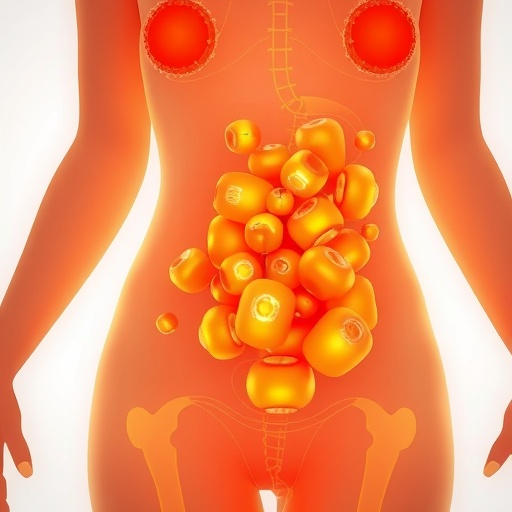
Polycystic ovary syndrome (PCOS) has emerged as one of the most prevalent endocrine disorders globally, affecting millions of women of reproductive age. A growing body of research is beginning to unravel the complex interplay between oxidative stress and inflammation in this condition. A recent study conducted by Padder et al. offers profound insights into these mechanisms, contributing significantly to the understanding of PCOS pathophysiology. The findings reveal not just the biological underpinnings of the disorder but also highlight potential therapeutic targets that could improve the quality of life for women suffering from this multifaceted syndrome.
The hallmark of PCOS is the presence of hyperandrogenism, which can manifest as irregular menstrual cycles and polycystic ovaries. However, these symptoms are just the tip of the iceberg. Clinical manifestations often extend beyond reproductive health, impacting metabolic, psychological, and cardiovascular domains. The authors of the study utilized a case-control design to assess the levels of oxidative stress markers and inflammatory cytokines, thus providing a comprehensive picture of the biological responses at play in women diagnosed with PCOS.
In their research, Padder and colleagues meticulously analyzed blood samples from participants, focusing on biomarkers like malondialdehyde (MDA), superoxide dismutase (SOD), and various interleukins central to inflammation. The results painted a stark contrast between women with PCOS and healthy controls, illuminating heightened oxidative stress accompanied by an inflammatory milieu. This biochemical evidence suggests that oxidative damage could be a contributing factor to the pathogenic process observed in PCOS.
Interestingly, the research identifies a specific link between oxidative stress and inflammatory responses. It posits that elevated oxidative stress can lead to increased production of pro-inflammatory cytokines, thereby creating a vicious cycle that exacerbates both conditions. Understanding this interplay is critical as it not only clarifies the underlying mechanisms of PCOS but also suggests that interventions targeting oxidative stress may provide dual benefits—ameliorating both oxidative damage and inflammation.
The implications of these findings extend beyond physiological understanding. They prompt healthcare professionals to consider a holistic approach to managing PCOS, moving away from solely hormonal treatments to potentially integrating antioxidant therapies. Nutraceuticals rich in antioxidants could offer a promising adjunct to traditional treatments, helping to mitigate oxidative stress and its inflammatory consequences, thereby improving patient outcomes.
One pivotal aspect emerging from this research is the role of lifestyle choices in managing oxidative stress. The study emphasizes the importance of diet, exercise, and weight management as significant factors that can influence both oxidative stress levels and inflammatory states in women with PCOS. Counselors suggest that engaging in regular physical activity and making dietary adjustments, such as increasing the intake of fruits and vegetables rich in antioxidants, could serve to lessen the symptoms associated with the syndrome.
Moreover, this research adds a significant layer to the existing literature by delineating the biochemical pathways involved in oxidative stress and inflammation. The authors argue for further investigation into specific antioxidant compounds and their roles in modulating the inflammatory response, which could lead to innovative treatment paradigms in the management of PCOS.
As our understanding of PCOS deepens, researchers like Padder et al. urge caution against oversimplifying the syndrome. They stress that therapeutic strategies must be individualized, taking into account the varied presentations of the disorder among patients. Consequently, future research should aim to explore the genetic and environmental factors that contribute to oxidative stress and inflammation in this population, further elucidating the complexity of PCOS.
The implications of this study also highlight the necessity for awareness and education regarding PCOS. Misconceptions about the disorder often lead to inadequate recognition and management of its symptoms. As such, the dissemination of research findings like those from Padder and colleagues holds the potential to improve clinical practice and patient education.
Furthermore, this research underscores the importance of continued exploration into the metabolic ramifications of oxidative stress. Women with PCOS are at increased risk for metabolic syndrome, and understanding the role of oxidative stress could provide a critical insight into preventive strategies. Educational initiatives aimed at healthcare providers can enhance awareness regarding these correlations, paving the way for more timely interventions.
In conclusion, Padder et al.’s study significantly enhances our comprehension of the pathophysiology underpinning PCOS, linking oxidative stress and inflammation. This research not only identifies potential therapeutic targets but also reinforces the importance of an integrative approach in managing this complex disorder. As we look to the future of PCOS research, the insights gleaned from this study could well illuminate pathways for more effective treatments and improve the overall health and well-being of women globally.
The convergence of oxidative stress, inflammation, and polycystic ovary syndrome forms a compelling narrative that calls for further investigation. As research continues to unfold, it will undoubtedly reveal more about how these interrelated phenomena affect not only reproductive health but also broader metabolic and psychological aspects of women’s lives.
Subject of Research: The interplay between oxidative stress and inflammation in polycystic ovary syndrome.
Article Title: Deciphering the interplay between oxidative stress and inflammation in polycystic ovary syndrome: outcome of a case-control study.
Article References:
Padder, K.A., Jahan, N., Yousuf, M.A. et al. Deciphering the interplay between oxidative stress and inflammation in polycystic ovary syndrome: outcome of a case-control study.
J Ovarian Res 18, 196 (2025). https://doi.org/10.1186/s13048-025-01734-y
Image Credits: AI Generated
DOI: 10.1186/s13048-025-01734-y
Keywords: Polycystic ovary syndrome, oxidative stress, inflammation, case-control study, metabolic syndrome, antioxidants.
Tags: biomarkers of oxidative stresscardiovascular health in women with PCOScase-control study on PCOShyperandrogenism and menstrual irregularitiesinflammation in polycystic ovary syndromemetabolic effects of PCOSoxidative stress in PCOSPCOS pathophysiology insightspsychological impact of PCOSreproductive health and PCOS managementrole of cytokines in PCOStherapeutic targets for PCOS





